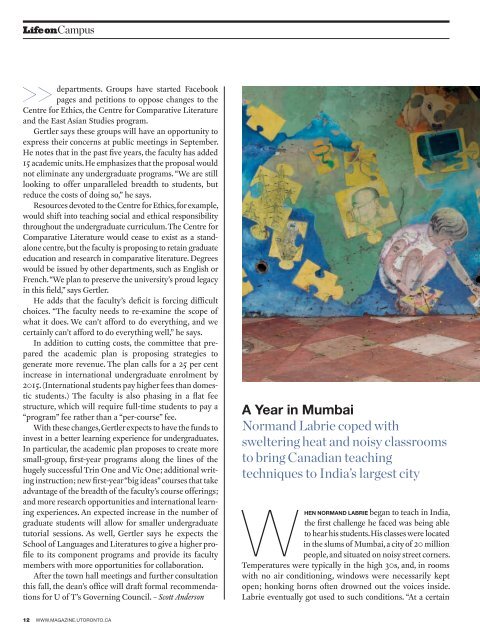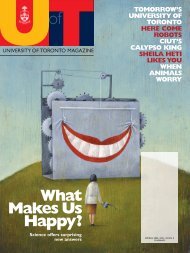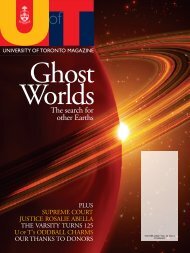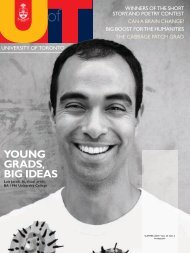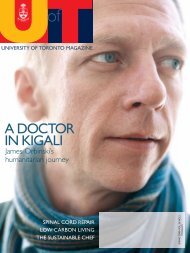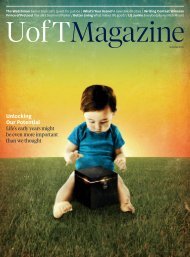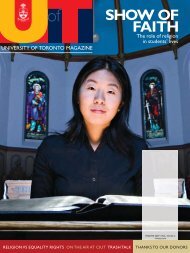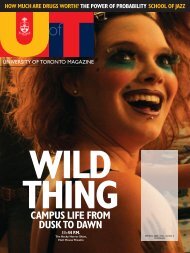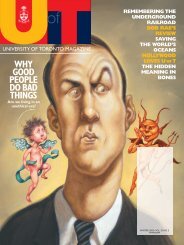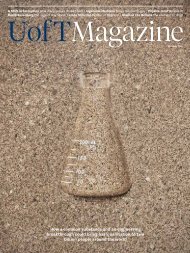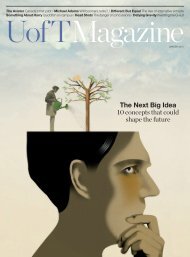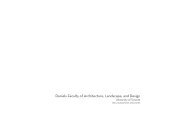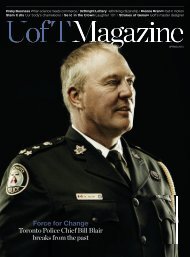Create successful ePaper yourself
Turn your PDF publications into a flip-book with our unique Google optimized e-Paper software.
LifeonCampusdepartments. Groups have started Facebookpages and petitions to oppose changes to theCentre for Ethics, the Centre for Comparative Literatureand the East Asian Studies program.Gertler says these groups will have an opportunity toexpress their concerns at public meetings in September.He notes that in the past five years, the faculty has added15 academic units. He emphasizes that the proposal wouldnot eliminate any undergraduate programs. “We are stilllooking to <strong>of</strong>fer unparalleled breadth to students, butreduce the costs <strong>of</strong> doing so,” he says.Resources devoted to the Centre for Ethics, for example,would shift into teaching social and ethical responsibilitythroughout the undergraduate curriculum. The Centre forComparative Literature would cease to exist as a standalonecentre, but the faculty is proposing to retain graduateeducation and research in comparative literature. Degreeswould be issued by other departments, such as English orFrench. “We plan to preserve the university’s proud legacyin this field,” says Gertler.He adds that the faculty’s deficit is forcing difficultchoices. “The faculty needs to re-examine the scope <strong>of</strong>what it does. We can’t afford to do everything, and wecertainly can’t afford to do everything well,” he says.In addition to cutting costs, the committee that preparedthe academic plan is proposing strategies togenerate more revenue. The plan calls for a 25 per centincrease in international undergraduate enrolment by2015. (International students pay higher fees than domesticstudents.) The faculty is also phasing in a flat feestructure, which will require full-time students to pay a“program” fee rather than a “per-course” fee.With these changes, Gertler expects to have the funds toinvest in a better learning experience for undergraduates.In particular, the academic plan proposes to create moresmall-group, first-year programs along the lines <strong>of</strong> thehugely successful Trin One and Vic One; additional writinginstruction; new first-year “big ideas” courses that takeadvantage <strong>of</strong> the breadth <strong>of</strong> the faculty’s course <strong>of</strong>ferings;and more research opportunities and international learningexperiences. An expected increase in the number <strong>of</strong>graduate students will allow for smaller undergraduatetutorial sessions. As well, Gertler says he expects theSchool <strong>of</strong> Languages and Literatures to give a higher pr<strong>of</strong>ileto its component programs and provide its facultymembers with more opportunities for collaboration.After the town hall meetings and further consultationthis fall, the dean’s <strong>of</strong>fice will draft formal recommendationsfor U <strong>of</strong> T’s Governing Council. – Scott AndersonA Year in MumbaiNormand Labrie coped withsweltering heat and noisy classroomsto bring Canadian teachingtechniques to India’s largest cityWhen Normand Labrie began to teach in India,the first challenge he faced was being ableto hear his students. His classes were locatedin the slums <strong>of</strong> Mumbai, a city <strong>of</strong> 20 millionpeople, and situated on noisy street corners.Temperatures were typically in the high 30s, and, in roomswith no air conditioning, windows were necessarily keptopen; honking horns <strong>of</strong>ten drowned out the voices inside.Labrie eventually got used to such conditions. “At a certain12 WWW.MAGAZINE.UTORONTO.CA


